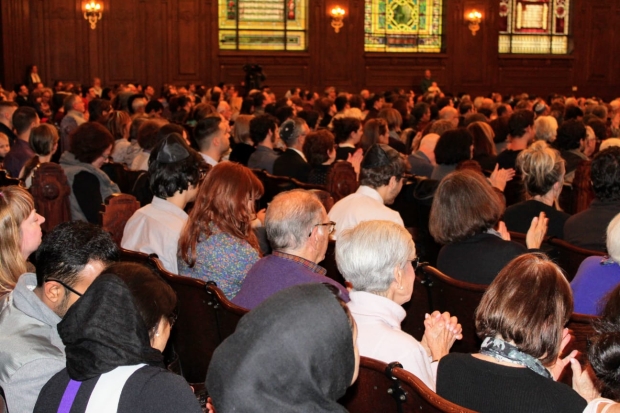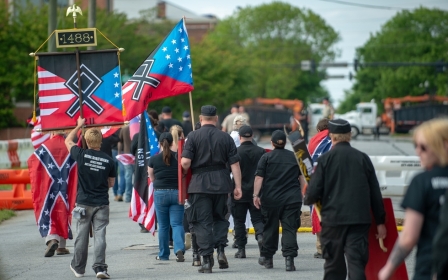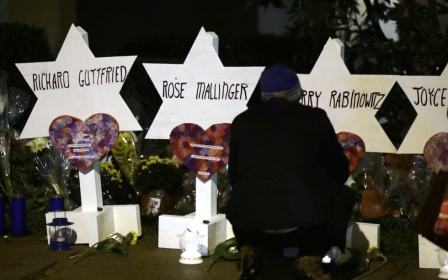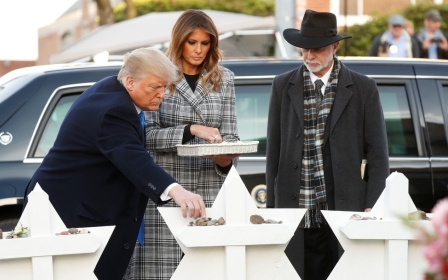Muslims and Jews stand together in grieving Pittsburgh
PITTSBURGH, United States - Among the kippahs at a memorial service for the Pittsburgh synagogue massacre victims on Friday, there were a few hijabs.
Wasi Mohamed, executive director of the Islamic Center of Pittsburgh, addressed mourners and worshippers at the Rodef Shalom Congregation, lauding the city's unity and the Jewish community's resilience.
"This wasn't about a hateful act; this was about a hopeful community building solidarity in the shadow of a crisis," Mohamed said.
An online crowdfunding campaign launched by Muslim activists across the country and coordinated locally by Mohamed has raised more than $230,000 for victims of the attack.
Mohamed told Middle East Eye the funds will go directly to funeral costs and other expenses that may stem from the tragedy.
"We wish to respond to evil with good, as our faith instructs us, and send a powerful message of compassion through action," the crowdfunding page reads.
This wasn't about a hateful act; this was about a hopeful community building solidarity in the shadow of a crisis.
-Wasi Mohamed, Islamic Center of Pittsburgh
Last Saturday, a gunman killed 11 people at the Tree of Life Synagogue in Pittsburgh. The alleged murderer had made anti-Semitic comments on social media.
The memorial service at Rodef Shalom marked the passing of one week since what is thought to have been the deadliest anti-Semitic attack in US history, and drew hundreds of people of all faiths and creeds from across the Pittsburgh area.
As Mohamed left the synagogue on Friday, several members of the Jewish community walked up to him to express their gratitude.
"The Jewish community in America and the immigrant Muslim community in America have very similar stories. The Jewish community just has been here earlier," Mohamed told MEE.
He explained that early Jewish immigrants were vilified and isolated, much like Muslims today.
Mohamed added that beyond their experiences as minority groups, Muslim and Jewish Americans share Abrahamic faiths that allow them to relate to one another.
"When you don't have everything painted in the lens of Israel-Palestine, you can actually talk about faith ... We're here; we can actually talk about theology and the [religious] differences - what they believe and what we believe and have intellectual dialogue and civil discourse around things," Mohamed said.
He added that personal relationships make discussions about the Middle East less divisive and more productive.
"We can talk about solutions. We can talk about how to move forward because we know each other," Mohamed said. "We won't hate each other for not agreeing."
Warm relations between Jews and Muslim in Pittsburgh predate the attack, activists say.
Still, Mohamed said the rush from the Muslim community to demonstrate solidarity after the tragedy has helped to erase any assumptions among Jewish Americans that Muslims may hate them.
"They didn't expect this level of love from our community to theirs," he said.
Zohra Lasania, programme director at the Council of American Islamic Relations (CAIR) in Pittsburgh, said ties between the Muslim and Jewish communities in the city are not new.
"We have always worked together," Lasania told MEE, describing Jewish Americans as "our own people".
She added that there is "no demarcation" between religious groups, which have always enjoyed a harmonious relationship in Pittsburgh.
Rebecca Remson, director of development and communications at Jewish Family and Community Services, a group that helps resettle refugees and provides humanitarian and social assistance, said it did not come as a surprise that the Muslim community came out in "full force" to show its support.
"That's something we have known for a long time - that the Muslim community is a strong partner of ours," Remson told MEE. "And the rest of the world now knows that this is a unified city. We've been a unified city. We'll continue to be a unified city."
Amid an increase in harsh rhetoric from politicians, matched with an uptick in hate crimes, including Islamophobia and anti-Semitism, it seems that Jews and Muslims in the US are facing common challenges.
Mohamed called the Pittsburgh attack a "huge turning point" for the city.
"We've had people come together who are really serious about change and tackling these issues. We're going to do it all together - Muslims and Jews leading the way," Mohamed said.
"We're going to be together in figuring out how to remove these diseases of hatred from the hearts of people in our region."
New MEE newsletter: Jerusalem Dispatch
Sign up to get the latest insights and analysis on Israel-Palestine, alongside Turkey Unpacked and other MEE newsletters
Middle East Eye delivers independent and unrivalled coverage and analysis of the Middle East, North Africa and beyond. To learn more about republishing this content and the associated fees, please fill out this form. More about MEE can be found here.





